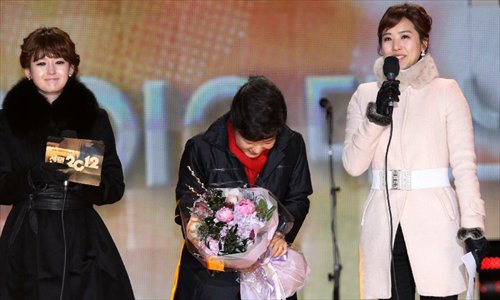Security tops Park’s agenda

South Korea's president-elect Park Geun-hye made it clear on Thursday that she wouldn't seek a cursory reengagement with North Korea at the cost of national security, while urging reconciliation, cooperation and peace in Northeast Asia based on "a correct historical perception" - an apparent aside to Japan's incoming prime minister Shinzo Abe.
In her first policy address at the Saenuri Party headquarters after Wednesday's historic election that ushered in the country's first female president, Park underlined the "grave security situation" posed by North Korea's long-range rocket launch last week.
"I will keep the promise I made to you to open a new era on the Korean peninsula, based on strong security and trust-based diplomacy," Park said, according to AFP.
Park, the eldest daughter of South Korea's most divisive former president Park Chung-hee, is set to take office in late February. During her election campaign, Park distanced herself from the hardline policy of outgoing President Lee Myung-bak toward Pyongyang.
Park promised dialogue with North Korea and didn't rule out a summit with the North's young leader Kim Jong-un. During a 2002 thaw in relations, Park, as a humanitarian envoy rather than a politician, met Kim Jong-il in Pyongyang and returned to Seoul via the two Koreas' land border after the meeting.
However, analysts said the chance for an adjustment to South Korea's policy toward the North will only come after a few months because North Korea hasn't yet been sufficiently punished for its daring defiance of UN resolutions with last week's rocket launch.
"The US is now pushing for tougher sanctions against Pyongyang, and Park must coordinate the timing of her re-engagement with South Korea's firm ally," said Cui Zhiying, director of the Korean Peninsula Research Institute at the Shanghai Tongji University.
Earlier this week, US State Department spokeswoman Victoria Nuland vowed to continue to isolate North Korea and increase the pressure on the North's regime. "And we're looking at how best to do that, both bilaterally and with our partners going forward, until they get the message," Nuland said.
US President Barack Obama on Wednesday congratulated Park on her election victory and said he looked forward to "working closely with the Park administration to further enhance our extensive cooperation."
Chinese foreign ministry spokeswoman Hua Chunying said Thursday that China is willing to work together with South Korea on promoting mutual strategic and political trust and maintaining peace, stability and development in the Northeast Asia region.
Later on Thursday, Park also held private talks with the ambassadors of the US, China, Japan and Russia in Seoul, the Yonhap News Agency reported.
Regarding her outlook on the Northeast Asia region, Park said, "I will try to work for greater reconciliation, cooperation and peace" in the region, but trust and stability have to be based on "a correct historical perception."
South Korea said Japan has not come to terms with its harsh colonial rule of the Korean Peninsula during 1910-45 and owes a formal apology and national compensation for the forced sexual slavery of Korean women during WWII.
Nonetheless, Abe, Japan's premier-in-waiting, said on Thursday that he would seek close communication with Park to enhance bilateral ties, according to Japan's Kyodo News Agency. Economic and personal exchanges between Japan and South Korea are solid and they share strategic interests, Abe added.
"The uncertainty of Japan's domestic politics and North Korea's unpredictable behavior in the international stage remain the two biggest threats to regional peace and stability in Northeast Asia after the main regional powers have taken on leaders," said a Chinese military strategist who requested anonymity.
"But what's certain is that both South Korea and Japan, the two closest allies of the US in this region, will seek stronger military deterrence abilities using the pretext of a growing threat from North Korea," the strategist said. "China must remain alert to this development."
Agencies contributed to this story